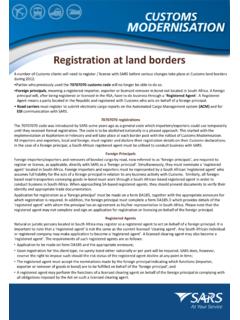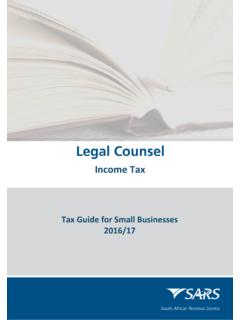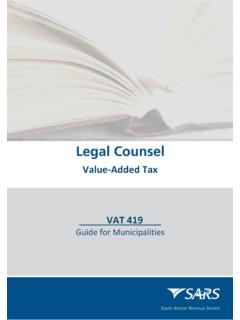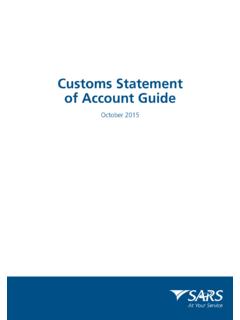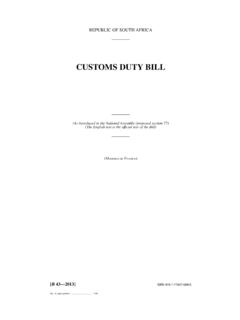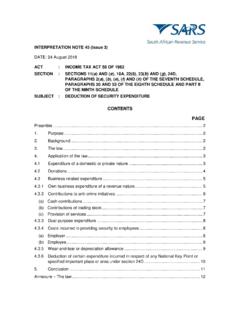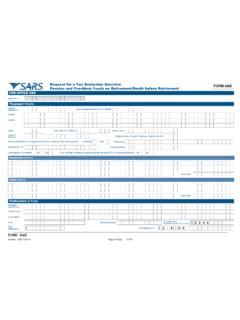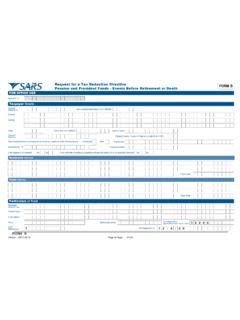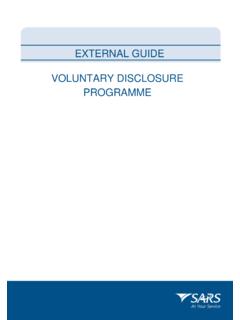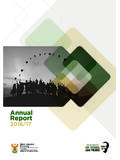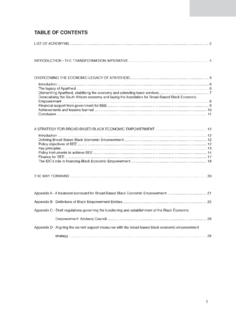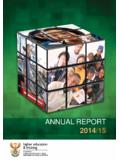Transcription of THE SUPREME COURT OF APPEAL OF SOUTH …
1 THE SUPREME COURT OF APPEAL OF SOUTH africa JUDGMENT Case No: 395/15 Reportable/Not reportable In the matter between: XO africa SAFARIS CC APPELLANT and THE COMMISSIONER FOR THE SOUTH AFRICAN REVENUE SERVICE RESPONDENT Neutral Citation: XO africa Safaris v CSARS (395/15) [2016] ZASCA 160 (3 October 2016) Coram: Navsa, Wallis, Saldulker and Mathopo JJA and Dlodlo AJA Heard: 5 September 2016 Delivered: 3 October 2016 Summary: Value Added Tax (VAT) local company assembling package tours for foreign tour operators and individuals whether supply of services attracting VAT at standard rate or whether zero rated in terms of s 11(2)(l) of Value Added Tax Act 89 of 1991 services supplied to person not a resident of the Republic but supplied directly to other persons who were in the Republic at the time the services were rendered VAT payable at standard rate.
2 2 _____ ORDER _____ On APPEAL from the Tax COURT , Johannesburg (Le Grange J) sitting as COURT of first instance): The APPEAL is dismissed with costs including the costs of two counsel. _____ JUDGMENT _____ Mathopo JA (Navsa, Wallis and Saldulker JJA and Dlodlo AJA concurring): [1] The appellant, XO africa Safaris CC (XO), assembled tour packages for foreign tour operators (FTO s) arranging for group and individual foreign tours to this country. These packages included accommodation, travel, restaurant bookings and recreational activities, such as golf, safaris, whale watching and the like (local services). Some of the tour groups were in SOUTH africa partly for business and partly for social purposes, in which event the packages included arranging meeting facilities and the like. XO accepted that this involved a supply of services to the FTO, but claimed that it was a supply that was zero rated in terms of s 11(2)(l) of the Value Added Tax Act 89 of 1991 (the Act).
3 The Commissioner: SOUTH African Revenue Services (SARS) contended that these services did not fall within s 11(2)(l), but were subject to the standard rate of VAT of 14% in terms of s 7(1) of the Act. [2] On 22 November 2010, after an audit, SARS gave a letter of audit findings to XO, indicating its intention to raise VAT at the standard rate on the supply of tour packages and services to FTO s during the tax periods to February 2008 and 2009 and April 2010. XO s attorneys responded indicating that XO would object to any assessment raised on that basis. A letter of assessment to VAT, together with penalties and interest, was issued on 4 March 2011 and the promised letter of objection came on 25 March 2011. The 3 objection was upheld in regard to penalties and, interest, but disallowed in relation to the assessment to VAT. Aggrieved by this decision, XO took the decision of SARS on APPEAL to the Western Cape Tax COURT (Le Grange J), which dismissed XO s case and held that XO directly supplied the local services to the FTO s and/or their customers on their behalves and accordingly VAT was payable at the standard rate.
4 This APPEAL is with the leave of that COURT . [3] At this stage it is necessary to set out in brief, in the paragraphs that follow, the relevant factual background. In doing so I borrow largely from the COURT a quo s judgment. Background facts [4] XO is a registered VAT vendor in terms of the Act. It operates a business involving the supply of services to FTO s which are non-resident in the Republic of SOUTH africa . The accommodation would be used, the meals eaten and the other activities enjoyed, by the members of the tour groups assembled by the FTO s. They or, in some cases involving commercial groups, their employers would pay the FTO for the right to enjoy these services and activities. These individuals had no direct contractual connection with XO, which contracted with the FTO. [5] According to SARS, XO contracted local suppliers to provide local services to itself and thereafter XO supplied the local services to the FTO or the FTO s customers when they were in the Republic.
5 It did this, according to SARS, by concluding contracts for the supply of the local services with the hotels, restaurants and other providers of such services and contracting separately with the FTO s to provide those services to the members of the tour parties when they were in SOUTH africa . When the agreements were concluded with the FTO s, neither the FTO s nor their customers were in the Republic. Once an agreement between XO and an FTO was concluded, XO arranged the local services with the local supplier if, it had not already done so, as was often the case. If prior arrangements had been made these would be confirmed. XO then invoiced the FTO for a lump sum which included the 4 local service provider s costs and its own mark-up. The FTO s were not advised and had no knowledge of the prices charged by the local suppliers.
6 [6] It is apparent that the mark-up set by XO was not fixed nor disclosed to the FTO s. The FTO s and their customers could not demand that the local supplier disclose the price it had charged. XO did not account to the FTO for the amounts which it received from them. The amounts charged by XO to the FTO were determined by reference to what the FTO was willing to pay for the local services. In its books of account, XO included the amounts invoiced to the FTO as sales and treated the costs invoiced to it by the local suppliers as expenses. In its annual financial statements the value of the services supplied by it to the FTO s was reflected in its gross revenue. XO s position in its books of account was therefore that it was acquiring services from the local service providers, which constituted its cost of sales, and included in its income amounts which it charged to the FTO s.
7 [7] In terms of the agreements with the FTO s it was the responsibility of XO to ensure that the local services were properly provided during the tours. XO employed consultants to make sure that the hotels and conference facilities were properly booked and set up. In the event of a problem with the local supplier it was incumbent upon XO to rectify the problem. The FTO and its customers played no role in this regard. This was because XO had a contract with the local supplier and FTO and its customers had no contract with them. The evidence [8] XO called three witnesses, Mr Charrieras, Ms Kimmich and Ms Mignot. Their evidence related to five group and individual leisure tours selected as typical. [9] The documents in relation to these tours indicated that XO contracted with local suppliers to provide local services to XO. XO arranged for the local services to be made available to the FTO s customers.
8 It is common cause that not all agreements between XO and the FTO s were reduced to writing. 5 The case was dealt with on the basis of these five inbound tours because they were accepted to be representative of XO s business operations and could be applied to all its dealings with FTO s. [10] Mr Charrieras testified that although written contracts were not always concluded with an FTO, the contractual relationship between XO and an FTO was that XO would provide the local services listed in the itinerary, budget or programme provided to it, and that the FTO would purchase such services. It was his evidence that the local services were provided in the Republic. He further testified that XO s consultants were normally posted at the hotels to deal with any problems raised by the FTO s or their customers. In cross-examination he conceded that the consultants were necessary because that s what [XO] are paid for , to ensure that the local services were provided during the tours.
9 It was his evidence that amongst the duties of the consultants would be to make sure that the conference facilities were correctly set up. At no stage were the complaints of the customers attended to by the hotel personnel. In relation to corporate tours the staff of XO were, on occasion, involved in checking that local suppliers were properly prepared to provide certain of the services. He said that XO had purchased the local services from the local supplier. Based on that he stated that XO was entitled to deduct input VAT charged by the local suppliers. Furthermore, his evidence continued, that in addition to the profit comprising its mark-up, XO made a further profit equivalent to 14% of the charges, because XO would claim an input VAT deduction in circumstances where XO did not pay output VAT.
10 This, in other words, meant that if XO was not liable for output VAT charged at 14%, it was making profit at the expense of the fiscus. [11] In cross-examination he conceded that the services were provided to the customers of the FTO when they were in the Republic, but denied that they were provided by XO. [12] Ms Kimmich gave evidence about how XO entered into agreements with local suppliers for the services to be supplied to XO. According to her no other entity or party was involved in the agreement. The unchallenged 6 evidence of Ms Mignot centred mainly around her role with regard to the preparation of the documents and emails in respect of the tours arranged for an FTO called Preference Events. [13] The emails reveal that XO was approached by Preference Events, and FTO s, to formulate a tour programme for a commercial entity, Total Lubrifiants.
